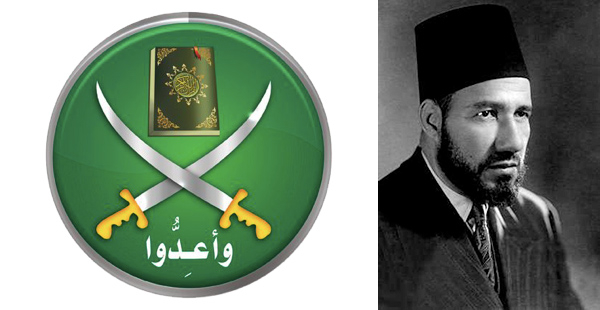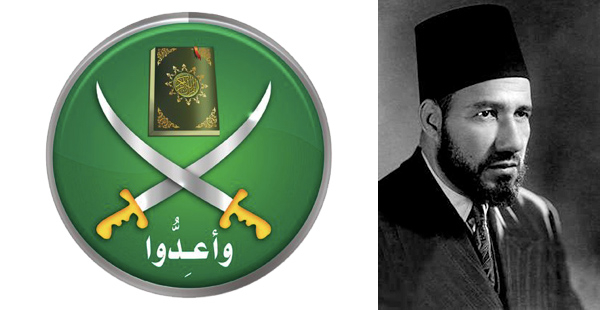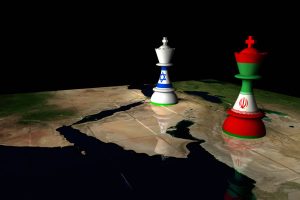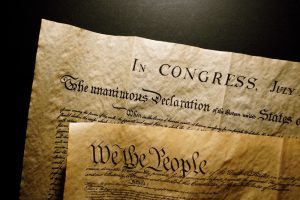In his inaugural address on January 20, U.S. President Donald Trump vowed to “unite the civilized world against… and eradicate radical Islamic terrorism.” So far, however, the administration in Washington, like its predecessors, has done little to rein in one of the key sources of this growing global phenomenon — the Muslim Brotherhood.
Founded by Sheikh Hassan al-Banna in Egypt in 1928, the Brotherhood does not always openly advocate violence. But its main agenda is to establish a worldwide Islamic Caliphate by way of the sword. As its motto reads: “The Prophet is our leader; jihad is our way; death for the sake of Allah is our wish.”

The emblem of the Muslim Brotherhood, and its founder, Hassan al-Banna. |
The Brotherhood’s hostility towards the United States has been clear. It not only backed the Taliban regime in Afghanistan, but founded al Qaeda, nineteen of whose operatives perpetrated the 9/11 attacks.
The final report of the Senate’s “Joint Inquiry into Intelligence Community Activities before and after the Terrorist Attacks of September 11, 2001” — released in December 2002 — revealed that U.S.-stationed Saudi intelligence officers, who provided assistance to the hijackers ahead of the World Trade Center and Pentagon bombings, were in direct contact with senior members of the American branch of the Brotherhood.
Where future operations are concerned, the Brotherhood currently instructs its members:
“…use diverse and varied surveillance systems to gather information…not look for confrontation with adversaries, at the local or the global scale, which would be disproportionate…and master the art of the possible on a temporary basis without abusing the basic [Islamic] principles.”
Unlike the Obama administration, which viewed the Brotherhood “as a moderate alternative to more violent Islamist groups like al Qaeda and the Islamic State,” the new U.S. government is taking a tougher rhetorical stance.
In his Senate confirmation hearings on January 11, Secretary of State Rex Tillerson referred to “agents of radical Islam like al Qaeda, the Muslim Brotherhood and certain elements within Iran.”
Meanwhile, U.S. Senator Ted Cruz (R-Texas), together with Congressman Michael McCaul (R-Texas) and Congressman Mario Diaz-Balart (R-Florida) reintroduced two bills aimed at holding Iran’s Islamic Revolutionary Guard Corps and the Muslim Brotherhood accountable for violent, Islamist, anti-Western ideology and enabling the U.S. to stifle the groups’ funding.
Moderate Muslims, too, favor action against the Brotherhood. Lebanese Shiite cleric Sheikh Mohammad Hajj Hassan, founder of the American-Muslim Alliance, on the face of it possibly not the most objective commentator on a predominately Sunni organization, called on Trump to designate the Brotherhood as a “Foreign Terrorist Organization.”
In February, Hassan told Fox News:
“Terrorism is the enemy of the whole humanity, including Muslims; these Takfiri [apostate] terrorist organizations distort the real image of Islam and offen[d] Muslims who want to live in peace and security with all segments of the society… This group since its inception practiced killing crimes and terror attacks in the Arab world. In Egypt, Syria, Tunisia and other countries their clerics call for violence.”
Washington can and should expect support, as well, from the civilized international community in tackling the Brotherhood, which poses a threat to the entire world. Indeed, the organization has active followers in more than 70 countries. One of these is India, which has an obligation to back the U.S. in the war against the Brotherhood and affiliate terrorist organizations, such as ISIS.
New Delhi can ill afford to overlook that during the Taliban regime in Kabul, the Brotherhood had training camps in Afghanistan for Kashmiri militants fighting against India and Central Asian states.
The time is not only ripe for the U.S. and its allies to eradicate the Muslim Brotherhood; it is well overdue.
The author is a senior journalist based in New Delhi.


























